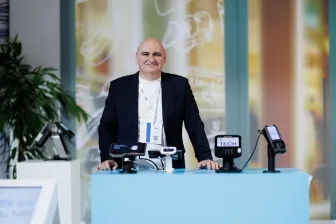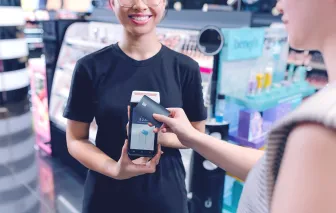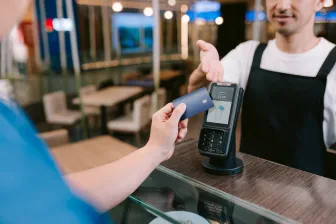This article summarizes the StartupIN program's first Fintech Chat at the Draper Startup House in Singapore. Ingenico's APAC Startup Engagement Lead, Ankit Maheswari, was joined by two other guest speakers, Dylan Tan, and Saksham Shubham, moderated by Prahlad Jaya. They candidly shared their experiences, challenges, and lessons on pivoting businesses in the fintech space.
Whether you're a startup or a Fortune 500 company, the ability to pivot your business is vital for your company's long-term success. Those who spot opportunities early and modify their business model quickly often grow into industry leaders with inspiring stories to tell.
This event's agenda focused on varied-sized companies and their journeys to thrive in new markets, adapt to evolving trends, and stay ahead of the competition. Both guest speakers demonstrated the power of purposeful pivot in the platform business. The article demonstrated how they identified their customers, peppered with resilience and out-of-the-box thinking as they aimed for success. While Ankit shared his perspective from a global corporate and how the StartupIN program plays a role in Ingenico's transformation journey.
From Buy Now Pay Later to Save Now Buy Later
Our first guest speaker was Dylan Tan, co-founder and CEO of Sugar. It's a Save Now Buy Later (SNBL) startup based in Malaysia spun from his Buy Now Pay Later (BNPL) startup Split.
BNPL is a financing service that allows customers to make a purchase instantly but deferred payment for a later date. Customers can spread the cost into multiple installments over a few weeks or months, making high-value items affordable for cash-strapped consumers.
SNBL, on the other hand, is a savings plan approach where customers set aside money in advance with a specific merchant for a desired purchase. SNBL consumers are free from debt and interest charges and are awarded cashback, rewards, or discounts when they reach their goal.
According to Dylan only a few people had heard of BNPL five years ago, and retailers were skeptical of the business model. Today, although the payment method has gained prominence in APAC in the last two to three years, BNPL is still developing in Asia.
At that time, to prove there's demand for such a service to validate his BNPL concept, Dylan took a "very risky" step. During Malaysia's general elections, he noticed citizens abroad couldn't afford to fly back home to vote. So, he made an offer on his social media to pay for their flight tickets upfront, and they could repay him in three months. This daring move got him his first customer but maxed out his credit card. Fortunately, everyone paid him back, proving the demand for his Buy Now Pay Later (BNPL) platform, Split.
When Dylan and his partner Vishvesh Suriyanarayanan launched Split, consumers started using it, and the startup clinched a deal with a travel agent. But when the pandemic hit and people could not travel, they had to redirect their business focus. Observing consumer buying habits online, he approached relevant merchants and eventually landed a major retailer in Malaysia.
As the market changed, Dylan and his partner encountered challenges due to internal metrics and external factors. Internally, their margins were shrinking despite growing their annual recurring revenue. They realized that their business model, which involved interest-free loans to customers, would no longer be viable as the cost of borrowing money increased. Externally, there's a shift in investors' sentiment, and a VC pulled out from Split's funding. The hype around their business model had diminished as interest rates rose, making the cost of debt more expensive.
The partners had to think of the company's long-term success. So, they decided to pivot from BNPL to SNBL, which promotes responsible spending and reduces the risk of incurring excessive debt and struggling with repayments. SNBL also taps into Southeast Asian consumer natural behavior of “saving up before buying” mindset. Sugar platform makes it easier for them with the added perks of earning rewards through cashback when they save up for their desired items on Sugar's app.
Insights on pivoting in startups from a platform business builder
Our next speaker was Saksham Shubham, Head of Business SEA for Decentro, an API platform for banking integrations. Saksham was formerly a co-founder who had scaled up three different startups and worked at Grab as Regional Head in Singapore, SEA.
When asked how to pivot a company successfully, Saksham answered that there are generally two categories. First, is the need to use a lot of data when deciding which way to go; this is mainly an approach taken by corporates. Second, is just testing things out, as demonstrated by Dylan's startup.
However, Saksham stated that sometimes businesses need to find the balance between data-driven and experimenting when pivoting. He gave an example of a well-known second-largest payment processing corporation's former CEO's method of investing 10% of the business profit in research and development. The Head of R&D could use the sum of money to experiment and fail as much as they like. But they will have to produce two commercially viable products at the end of two years. But, he said, that's the luxury of a big corporation with massive amount of data.
For startups, Saksham said that they are constantly building, and the data set is usually small. So, he advised startup founders to listen to their customers. He added that it is also essential for founders to don’t just listen to any feedback but also look at the elements of the feedback. Although data analytics may come into play when getting feedback, founders could be looking at a skewed data set. It's because they might just be talking to the people they want to speak to or biased in some way towards their business.
He related this example to his company which wanted to replicate a successful model in India in Southeast Asian markets. He soon discovered that the cut-and-paste approach would not work. Each SEA country has different nuances and levels of development. Saksham said they address the issues by keeping their customers of respective country at the center of what they do and micro-pivoting every aspect of the business to fit into each market.
Corporate Innovation: From point-of-sale to point-of-commerce
Our last speaker was Ankit Maheswari, APAC Startup Engagement Lead of the Ingenico StartupIN Program. He shared about Ingenico's journey as a payments company with over 42 years of history in the industry.
Ankit spoke about how Ingenico began as a provider of point-of-sale (POS) payment terminals to now a point-of-commerce (POC), leveraging its global footprint and network. Today, Ingenico is a global leader in payment acceptance solutions and a trusted technology partner for merchants, banks, acquirers, ISVs, payment aggregators, and fintech partners in over 37 countries.
Ingenico's strategic shift to be flexible and agile reflects the evolving payments market landscape. Its journey transitions from a just hardware-focused payment terminals business into a dynamic and complete payments technology solutions provider, which includes software and as-a-service solutions model.
Ankit then introduced the Ingenico's StartupIN program to the audience. It is a platform that focuses on supporting and collaborating with innovative payments startups. The program aims to identify and nurture startups that bring unique use cases and solutions to the in-store payments market. The StartupIN team works with startups who are looking to make an impact in various domains and industries, and he highlighted some of the use cases that is currently in the works.
One of the use cases that he shared was a digital receipt startup. The company enables customers to make payments through their phones without sharing personal information or downloading an app. It generates a receipt via NFC on the phone, providing a convenient and sustainable alternative to paper receipts.
Another interesting use case in the program was enabling crypto payments in-store. The startup developed a solution where customers can scan a QR code and make payments directly from their crypto wallets. This opens opportunities for using cryptocurrencies for high-value purchases, where current payments options are limited.
The StartupIN program also collaborates with a Singapore-based startup that provides extended warranty services. Customers can add extended warranty coverage to their purchases at the point of sale for an additional fee. This is done seamlessly at the terminal, giving customers peace of mind and protection for their purchases.
On the program, Ankit said that Ingenico recognizes the complexity of the payments ecosystem, involving multiple stakeholders and activities, and aims to simplify it through collaboration, partnerships, and a single platform for partners and customers. In short, the StartupIN program supports startups with innovative use cases and helps them navigate the challenges of entering the in-store market.
The StartupIN program reflects Ingenico's commitment to staying engaged with the fintech community, understanding the changing customer expectations, and enabling seamless commerce experiences.
To close the event, Ankit invites startups who see themselves fitting into the in-store payments space to join the StartupIN program. It is an ecosystem of payment experts and members who can provide feedback and advice on scaling a startup business. It also serves as a platform for startups to connect, learn, and grow.
About StartupIN Program
The StartupIN Program focuses on early-stage startups in the in-store commerce domain, offering access to Ingenico's technology stack, payment expertise, and commerce ecosystem.
Whether you're an in-store native or planning to enter the space, if you need to embed payment and commerce capabilities into your products or services and tap into go-to-market routes for in-store commerce, we provide the tools and resources to support your journey.
Collaborative activities and partnerships with our program alums and Ingenico create a win-win-win scenario, fostering innovation and seamless in-store commerce experiences.
Join us today to elevate your startup and tap into the thriving in-store commerce market!











